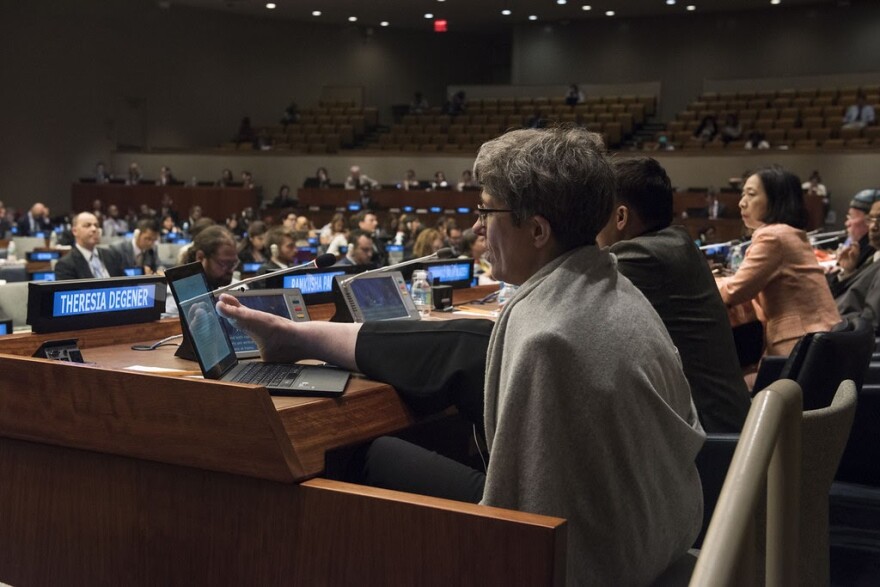This article is related to VPM’s ongoing Instagram TV series, "Spectrum of Expression ." Follow us on Instagram @myVPM to watch new episodes every day through the end of Deaf History Month on April 15.
Oralism, the idea that spoken language is often considered superior to signed language, isn’t a new phenomenon. By the 1880s, notable figures like Alexander Graham Bell promoted oralism and assimilation to speaking culture so much that American Sign Language was banned in Deaf schools.
Since then, d/Deaf/Hard of Hearing advocates have worked to reverse the stigma against gestural communication. Part of that advocacy has yielded that descriptive term: d/Deaf/Hard of Hearing. The term includes:
- Lowercase “d”-deaf: The physical condition of hearing loss, or someone who identifies as deaf without feeling a strong sense of connection to the Deaf community. Sometimes lowercase “d”-deaf people prefer to communicate with spoken language instead of sign language.
- Uppercase “D”-Deaf: Someone who identifies as culturally Deaf based on their experiences with the Deaf community, sign language, or personal background. Oftentimes, uppercase “D”-Deaf people prefer to communicate with sign language.
- Hard of Hearing: Someone who experiences mild-to-moderate hearing loss, and may or may not use sign language to communicate.
The use of these terms replaces language like “hearing impaired,” which can imply poor communication among people who can communicate well using non-verbal language. As d/Deaf/Hard of Hearing advocates worked to elevate their own stories, they garnered national attention. In 2006, The American Library Association officially recognized Deaf History Month and began its annual celebration of Deaf history and culture.
Deaf History Month commemorates several historic anniversaries for the d/Deaf/Hard of Hearing community, including:
April 15, 1817: The American School for the Deaf is founded in West Hartford, Connecticut, the first school for d/Deaf/Hard of Hearing students.
April 8, 1864: Gallaudet University is chartered by Abraham Lincoln in Washington, D.C. as a grammar school for Deaf and blind students.
March 13, 1988: Gallaudet University appoints its first Deaf president, I. King Jordan, after students lead a protest demanding a “Deaf President Now.”
Shortly after Gallaudet appointed its first Deaf president, d/Deaf/Hard of Hearing advocates made strides in legislation and recognition alongside other advocates for disability rights.
July 26, 1990: The Americans with Disabilities Act is passed, mandating the inclusion and accommodation of d/Deaf/Hard of Hearing people.
March 13, 2006: National Deaf History Month is celebrated for the first time in the United States.

December 13, 2006: The United Nations adopts the Convention on the Rights of Persons with Disabilities, encouraging a global movement to accept people with disabilities as full and equal members of society.

Want to learn more? Check out these resources:
National Deaf History Month: National Deaf History Month | GWSPH Department Announcements
Resources from Gallaudet University:
-Deaf Historical Resources – Gallaudet University
-National Deaf History Month: Exploring Deaf Culture with Library of Congress Primary Sources | Teaching with the Library of Congress
-Celebrating Education during Deaf History Month | Picture This: Library of Congress Prints & Photos
-National Deaf History Month: Exploring the Record of Advocacy – The JFK Library Archives: An Inside Look
Library collections for National Deaf History Month:
- National Deaf History Month: Celebrating an American Community | Los Angeles Public Library
-Observing Deaf History Month | New York Public Library
The National Deaf Life Museum at Gallaudet University:
-National Deaf Life Museum at Gallaudet University
Resources for d/Deaf/Hard of Hearing Virginia residents:
-Northern Virginia Resource Center for Deaf & Hard of Hearing Persons – Improving Communication, Changing Lives
-2020 Directory of Services for People who are Deaf, Hard of Hearing, and DeafBlind
- Virginia Deaf and ASL Social Events
-Richmond Club of the Deaf (RCD)
-History
-Virginia Association of the Deaf Resource List
-The Virginia School for the Deaf and the Blind
-Wednesday Webinars – The Virginia School for the Deaf and the Blind
-ASL Videos – The Virginia School for the Deaf and the Blind













